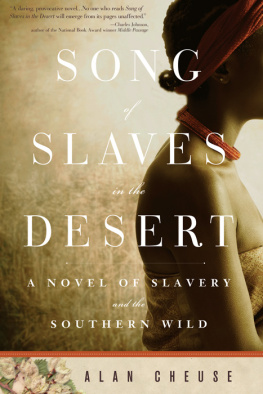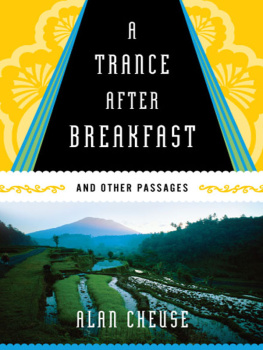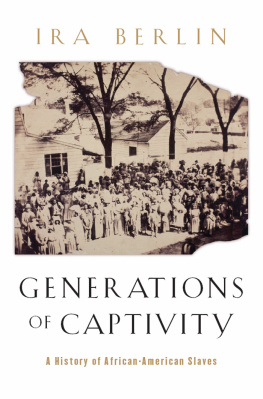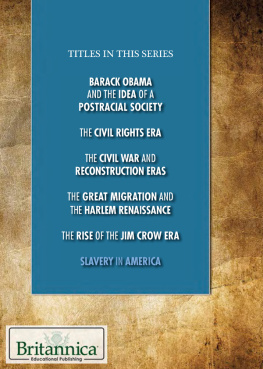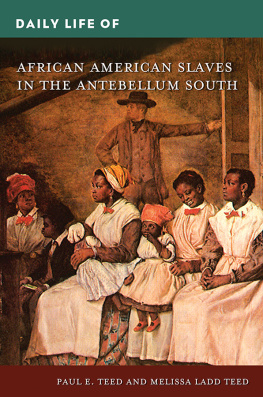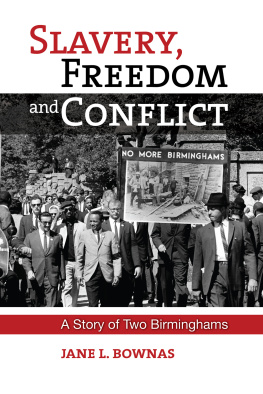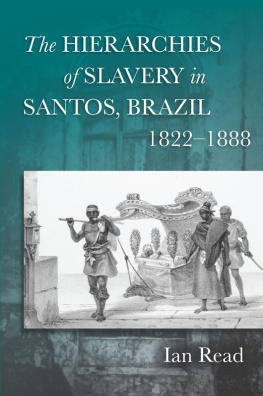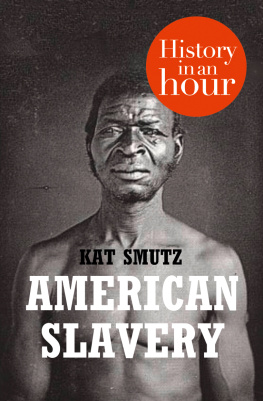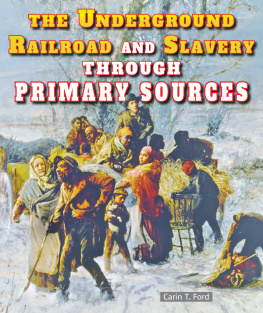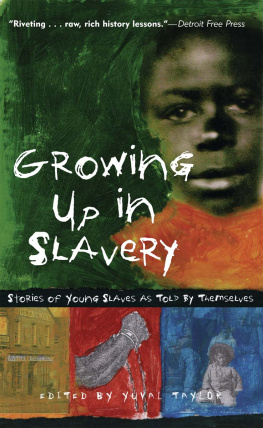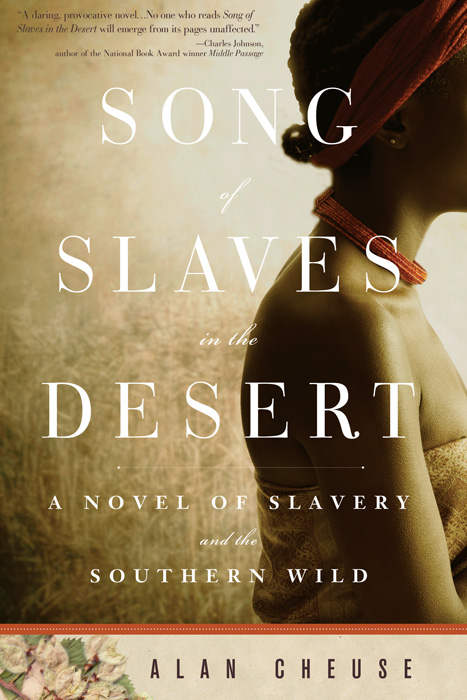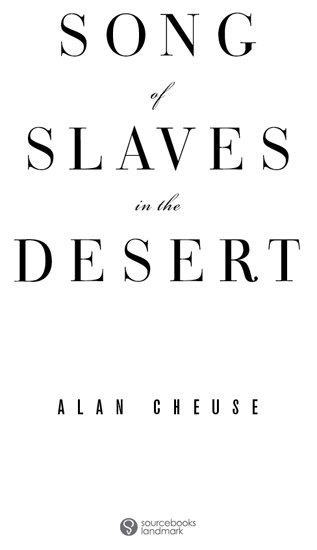Copyright
Copyright 2011 by Alan Cheuse
Cover and internal design 2011 by Sourcebooks, Inc.
Cover design by Natalya Balnova
Cover images Colin Anderson/Getty Images
Sourcebooks and the colophon are registered trademarks of Sourcebooks, Inc.
All rights reserved. No part of this book may be reproduced in any form or by any electronic or mechanical means including information storage and retrieval systemsexcept in the case of brief quotations embodied in critical articles or reviewswithout permission in writing from its publisher, Sourcebooks, Inc.
The characters and events portrayed in this book are fictitious or are used fictitiously. Any similarity to real persons, living or dead, is purely coincidental and not intended by the author.
Published by Sourcebooks Landmark, an imprint of Sourcebooks, Inc.
P.O. Box 4410, Naperville, Illinois 60567-4410
(630) 961-3900
Fax: (630) 961-2168
www.sourcebooks.com
Library of Congress Cataloging-in-Publication Data
Cheuse, Alan.
Song of slaves in the desert / by Alan Cheuse.
p. cm.
1. Slavery--Africa--History--Fiction. 2. Slavery--Southern States--History--Fiction. 3. Plantations--Southern States--History--Fiction. 4. Jews--Southern States--History--Fiction. 5. Jewish fiction. I. Title.
PS3553.H436S66 2011
813.54--dc22
2010048514
Contents
For Minalu
An Eruption, the Stone
The shock wave jarred them from sleep and sent them stumbling to their feet. Next came the roar of exploding earth and a sky in flames. From that maelstrom in the heavens did a voice call out to them? Go! Hurry! The three of them, the man first, the woman following slightly behind, the child trailing off to one side, hurried away across the steaming plain, making their first marks, footprints, in the yielding layer of ash.
Light shifted behind the veil of smoky sky. The rumbling went on and on. The man shouted at the gathering mist, coughing as he breathed. The girl slowed up, listed toward the plain, reached down and plucked at the ash. They walked, they walked. Light turned over, revealing a blue sky streaked with a long tail of smoke and ash. The girl pulled away from her mother, clutching something in her hand.
This stone, relatively cool to the touch, born of an earlier eruptionthis small, egg-shaped stoneblack bluish purple mahogany cocoa dark fire within, three horizontal lines, one vertical, the same pattern carved into your high cheekstake it and hold it to your lips. Taste earth and sky, the inside of a mouth, the lining of a birth canal, the faintest fleck of something darker even than the blackness through which it has passed. You have now kissed wherever this stone has been, and it has traveled far.
She said this to her child, as her mother had said to her, and her mothers mother before that, and mothers and mothers and mothers, a line stretching all the way back to the first darkness and the first light, from where the stone had spurted up from the heart of the rift, in fire and smoke and steam, blurring the line where light of earth met light of sun, though at night the line showed starkly again.
Who first carved those lines on its face, three horizontal, one vertical? Three horizontalthe trek across the land. The one verticalthe ascent into the heavens. What hand and eye had kept them straight, in both directions, across and up and down? What hands had passed it along from time through time, until it lay in the palm of a man sprawled on his back on the desert floor between the town and the river?
Chapter One
________________________
To the West!
A single bright star glowed steadily like a stone fixed in the firmament of ocean blue sky above the red mosque, years and years back, when her grandparents were children. Their children? The jar-maker and his wife, he was the potter, she the weaver who made the cloth that held the jars with the distinctive designthree horizontal lines, one verticaland supplied the household wares to the sheik who paid for the mosque. The father of the jar-maker had put him out to service with the sheik in exchange for the guarantee of an annual supply of grain for the family. In the seventh year of his service, when his father had died and the grain had rotted, the young artisan met the woman who would become his wifebecause he noticed the cloth she had woven hanging in the market and imagined his jars wrapped in her weavinga sign of lightning, a splash of rain, a distinctive design.
This turned out to be either a very good thing or a very bad thing. Her father would not give her up without a large payment, and the young jar-maker had to pledge another ten years to the sheik in order to buy this woman as his wife. As the story went, after the sheik, or, to be specific, his bookkeeper, agreed, the young jar-maker walked away, out to the edge of the town, where the river turned southit flowed east from near the coast before bending around the city in its southerly wayand looked up into the clear sky and saw a river stork pinned by the light against the pale blue screen of air. He allowed his mind to soar up with the bird, wondering what the future might be like, and if he would ever become a free man, when in the distance the muezzin sang the call to prayer. The potter returned to the town having decided that he would give up one thing in his life, in this case, ten more years, in order to obtain another.
In a crowd of men dark-haired and white, he bent far forward and touched his forehead to the cool tiles of the floor, breathing in breath and sweat, sweet-wretched body-gas and tantalizing anise, and when he drew himself upright again he saw in his mind the weaver, the years ahead, and he knew that he had chosen the right path.
Who knows how to tell of the passing of ten years in happiness and some struggle in just a few words, so that the listener has a sense of how quickly time passes and yet still captures the bittersweet density of all that time together? Bodies entangled at night, hands working together at their craft, cooking, washing, bathing, cleaning, praying, and now and then stealing the time to wander along the river and do nothing but watch for the rising of that same stork he had seen on that day that now seemed so long past.
The weaver gave birth to their first child, a boy. And then another, a girl. And then, another girl.
(And oh, my dear, she said, try to tell you this about birth and you discover how far short of real life words fall, and yet how else to make any of these events known? Words! Words, words, words! The weight, the aches, the fears, the stirring, the shifting bleeding tearing pain and struggle! And the cries of mother, and child! But what do we have but memories, and these translated into words?)
And then there arose a situation on which everything else turned.
It had been the custom, as you may already have wondered about, that artisans such as the jar-maker and weaver might live outside the sheiks compound, even as in other cities the situation might be the reverse. The jar-maker found this to be a good arrangement. It gave him all of the seeming liberty of a free man, at least in that he could move about the city, and when it came time to deliver his goods to the sheiks compound he faced the bookkeeper almost as though he were an equal.
Six large water jars, he said one morning in the cool season when the river in the distance had become carpeted with migrating birds.

